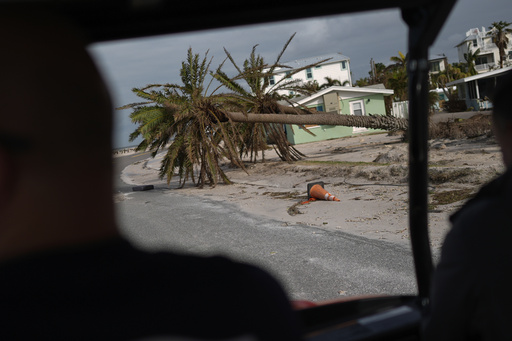A recent analysis has revealed that human-driven climate change increased the rainfall associated with Hurricane Milton by 20 to 30% and intensified its winds by about 10%. This report follows closely on the heels of Hurricane Helene, which caused widespread destruction in the southeastern United States and was also exacerbated by climate change.
Researchers from World Weather Attribution (WWA) released their findings on Friday, indicating that in the absence of climate change, Hurricane Milton would have made landfall as a weaker Category 2 storm, which does not fall into the ‘major’ storm category, rather than a robust Category 3.
Although WWA’s rapid assessments are not subject to peer review, they adhere to methodologies that have been peer-reviewed. The researchers benchmark current weather events against conditions that would be expected in a world without the approximate 1.3-degree Celsius increase in temperatures since the pre-industrial era.
To evaluate the effects of climate change on hurricanes, scientists analyze weather data alongside climate models. For Hurricane Milton, which occurred soon after Hurricane Helene, the researchers relied solely on observed meteorological data. WWA stated that despite using varying methods, their findings align with earlier studies suggesting an increase in hurricane intensity of between 10 to 50% attributable to climate change, along with a significant rise in their occurrence.
“We are therefore confident that such changes in heavy rainfall are attributable to human-caused climate change,” WWA noted. This international collective of scientists, formed in 2015, specializes in expedited studies regarding climate attribution.
Hurricane Milton resulted in the loss of at least eight lives and caused extensive damage, even though it didn’t make a direct hit on Tampa as anticipated. Its impact was felt across various regions with widespread flooding on roadways and numerous tornadoes affecting coastal areas. At its peak, the hurricane left around 3.4 million customers without power, and more than 2.4 million continued to lack electricity as of Friday morning.
Making landfall as a Category 3 hurricane on Wednesday evening off the west coast of Florida near Siesta Key—approximately 70 miles south of Tampa Bay—Milton’s severity was fueled by ocean water temperatures nearing record highs.
Climate scientist Michael Mann expressed alignment with the findings of this analysis, asserting that climate change significantly exacerbated the hurricane. He suggested that the study might “vastly understate the impact” of climate change due to its straightforward methodologies.
Mann referenced other attribution studies conducted after Hurricane Helene that indicated a substantially larger increase in rainfall linked to global warming. He remarked, “It’s the difference between a modest effect and a major effect,” arguing that the devastating flooding observed across much of the southeastern U.S. due to Helene was indeed a severe consequence of human-induced warming.
Meteorologist Jeff Masters, co-founder of Weather Underground, affirmed his support for the WWA findings, which state that without climate change, Hurricane Milton would have emerged as a Category 2 storm.
Additionally, another report from Climate Central earlier this week highlighted that climate change significantly contributed to the warmer water temperatures that intensified Hurricane Milton. According to Andrew Pershing, the organization’s vice president for science, such warm waters have become up to 200 times more likely due to climate interactions, with temperatures exceeding the 1991 to 2020 average by more than 1.8 degrees Fahrenheit (1 degree Celsius).
